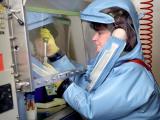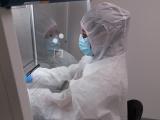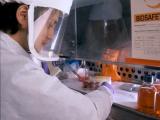Dec 5, 2008 (CIDRAP News) – The US Department of Homeland Security (DHS) today said Kansas State University (KSU) is its preferred site among six candidates for a facility to replace the federal Plum Island Animal Disease Center in New York.
The National Bio and Agro-Defense Facility (NBAF) will be located next to campus and will attract hundreds of animal researchers to the area, the university said yesterday in a press release. Jon Wefald, KSU president, said in the statement, "We are talking about a half-billion dollar animal health facility that will be the finest laboratory of its kind in the entire world."
The rationale behind DHS's choice of KSU, which will be the nation's first biosafety level 4 (BSL-4) lab for studying livestock diseases, is contained in the final environmental impact statement released today on the agency's Web site. Jay Cohen, undersecretary for science and technology for DHS, said in a press release that the final assessment of the sites was extensive and that it carefully weighed the concerns of all stakeholders.
"This facility, once built, will help us to protect our livestock industry, food supply, and public health from the accidental or intentional introduction of a foreign animal or zoonotic disease in the US," he said in the statement.
According to previous reports, the Plum Island lab is the only US facility that can work with the foot-and-mouth disease (FMD) virus, but DHS has said the lab is too small for current research needs and is unsuitable for conducting BSL-4 studies on animals. In addition to Kansas, the sites considered by DHS included San Antonio, Tex.; Flora (Madison County), Miss.; Athens, Ga.; Butner (Granville County), N.C., and Plum Island.
Diseases that will likely be studied at the NBAF include African swine fever, contagious bovine pleuropneumonia, FMD, Japanese encephalitis, and Rift Valley fever, all of which require work in a BSL-3 lab, according to DHS. Other diseases that might be studied at the lab include Hendra and Nipah viruses, both of which require BSL-4 containment.
DHS projected in its statement today that construction will begin in 2010 and that the facility will be operating by 2015.
In July, DHS issued an environmental impact study on the six sites it was considering for the NBAF, which revealed that a leak of FMD would cause the greatest economic loss at the KSU site, which is located not far from livestock operations. DHS estimated that a leak of the pathogen there would cost $4.2 billion, including $1 billion from livestock industry disruption.
When examining the risk of an accidental or intentional release of Rift Valley fever or Nipah virus, DHS found that the chance was none to low for all accident scenarios except for an over-pressure fire involving an explosion in an enclosed area.
DHS concluded that the KSU site was chosen because it was close to existing biohazard research, had strong community support, and came with generous incentives from the state. It added that the environmental risks posed at the Kansas site were comparable to other sites. The "environmentally preferable" option, according to DHS, would be to not replace the Plum Island facility, but that choice does not address the nation's security needs or DHS's research objectives.
Ron Trewyn, KSU's vice president for research, led the efforts to secure the NBAF, the university said in its press release. He coordinated outreach to the Kansas Bioscience Authority, the Midwest Research Institute, the Kansas City Area Life Sciences Institute, and other states and universities.
The choice of the KSU site won't be finalized until after a 30-day comment period, which could involve legal challenges from sites that weren't selected, according to an Associated Press (AP) report.
In related developments, officials from the US Army recently announced that it has ordered more security training at six of its biodefense labs as part of its response to Federal Bureau of Investigation findings that an Army researcher, Bruce Ivins, was responsible for the 2001 anthrax attacks, the AP reported on Dec 2.
Michael Brady, special assistant to Army Secretary Pete Geren, said the new training is designed to reinforce existing security policies and was recommended as a first step by a task force that is reviewing lab security in the wake of the Ivins revelations, according to the AP.
The Fort Detrick lab where Ivins worked is the first to undergo security refresher training, which began on Dec 1, the AP reported.
The Army also announced that it would permanently shutter the Armed Forces Institute of Infectious Diseases, a laboratory at Walter Reed Army Medical Center in Washington, DC, according to the AP report. The Army stopped work at the facility in April because of security problems.
See also:
Jul 3 CIDRAP News story "Leak from proposed ag lab could cost billions"
Chapter 2 of the DHS' final environmental impact statement


















